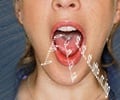Scientists at the University of East Anglia (UEA) have created lip-reading computers that can distinguish between different languages.
Scientists at the University of East Anglia (UEA) have created lip-reading computers that can distinguish between different languages.
Computers that can read lips are already in development but this is the first time they have been 'taught' to recognise different languages. The discovery could have practical uses for deaf people, for law enforcement agencies, and in noisy environments.Led by Stephen Cox and Jake Newman of UEA's School of Computing Sciences, the groundbreaking research will be presented at a major conference in Taiwan on Wednesday April 22.
The technology was developed by statistical modelling of the lip motions made by a group of 23 bilingual and trilingual speakers. The system was able to identify which language was spoken by an individual speaker with very high accuracy. These languages included English, French, German, Arabic, Mandarin, Cantonese, Italian, Polish and Russian.
"This is an exciting advance in automatic lip-reading technology and the first scientific confirmation of something we already intuitively suspected that when people speak different languages, they use different mouth shapes in different sequences," said Prof Cox.
"For example, we found frequent 'lip-rounding' among French speakers and more prominent tongue movements among Arabic speakers."
Funded by the EPSRC, the research is part of a wider UEA project on automatic lip-reading. The next step will be to make the system more robust to an individual's physiology and his or her way of speaking.
Advertisement
SRM








